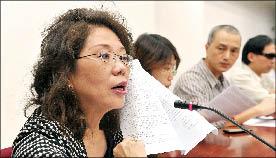About a dozen people from a community college and an animal rights group gathered at the Council of Agriculture yesterday to present a petition urging the council to put an immediate stop to the slaughter of poultry in traditional markets.
Students from Taipei City Wenshan Community College, accompanied by college president Cheng Hsiu-chuan (鄭秀娟), teacher and lawyer Tien Meng-chieh (田蒙潔) and representatives from the Environment and Animal Society of Taiwan (EAST), asked the council to explain why a proclamation prohibiting the slaughter of poultry in traditional markets that was to be announced in April 2008 was first postponed and finally abandoned last year.
EAST executive director Wu Hung (朱增宏) said the Executive Yuan announced a policy -prohibiting all poultry slaughter and selling of live poultry in traditional markets in August 2006 — a policy that should have come into force in April 2008 and for which related government agencies had planned supporting budgets.

Photo: CNA
However, the council postponed the implementation of the policy in 2008 for another two years, saying preparations had been insufficient, Wu said.
The council then changed its policy last year by announcing that poultry could be slaughtered at registered market stands, he said.
The advocates said the prohibition related not just to animal welfare, but was also a way of preventing the spread of avian influenza and ensuring sanitary conditions.
Tien said the new proclamation violated the Animal Industry Act (畜牧法) and the Communicable Disease Control Act (傳染病防治法), and that according to the Administrative Procedure Act (行政程序法), when a proclamation is in violation of the law, it should be invalidated.
Peng Ming-hsing (彭明興), deputy director of the Meat Inspection Division at the council’s Bureau of Animal and Plant Health Inspection and Quarantine, accepted the petition and promised to make a formal response within a month.
Responding to a student question as to why prohibition could not be enforced, Peng said the council had considered many elements, including the receding risks of an epidemic, traditional customs favoring fresh native chicken meat and the fact that certain big cities, such as New York City, still allow the slaughter of fresh poultry.
Council data from last year show there are 62 registered poultry slaughterhouses in Taiwan, which handle about 120 million chickens every year.
Moreover, the council provided subsidies of NT$4.18 million (US$138,000) to 13 slaughterhouses from 2002 to 2004 and NT$216 million to 22 slaughterhouses from 2006 and 2007.
The council has made an effort to support the establishment of legal slaughterhouses and conducted regular examinations on the more than 1,000 registered poultry slaughter stands to ensure the strictest sanitary standards were maintained, Peng said.
He added that there had been a clear change in consumer preferences because the number of registered stands had dropped to 1,163 in September, or 523 stands less than in May.
The animal rights advocates said they would consider taking legal action if the formal response from the council failed to address their concerns.

A preclearance service to facilitate entry for people traveling to select airports in Japan would be available from Thursday next week to Feb. 25 at Taiwan Taoyuan International Airport, Taoyuan International Airport Corp (TIAC) said on Tuesday. The service was first made available to Taiwanese travelers throughout the winter vacation of 2024 and during the Lunar New Year holiday. In addition to flights to the Japanese cities of Hakodate, Asahikawa, Akita, Sendai, Niigata, Okayama, Takamatsu, Kumamoto and Kagoshima, the service would be available to travelers to Kobe and Oita. The service can be accessed by passengers of 15 flight routes operated by

MORE FALL: An investigation into one of Xi’s key cronies, part of a broader ‘anti-corruption’ drive, indicates that he might have a deep distrust in the military, an expert said China’s latest military purge underscores systemic risks in its shift from collective leadership to sole rule under Chinese President Xi Jinping (習近平), and could disrupt its chain of command and military capabilities, a national security official said yesterday. If decisionmaking within the Chinese Communist Party has become “irrational” under one-man rule, the Taiwan Strait and the regional situation must be approached with extreme caution, given unforeseen risks, they added. The anonymous official made the remarks as China’s Central Military Commission Vice Chairman Zhang Youxia (張又俠) and Joint Staff Department Chief of Staff Liu Zhenli (劉振立) were reportedly being investigated for suspected “serious

ENHANCING EFFICIENCY: The apron can accommodate 16 airplanes overnight at Taoyuan airport while work on the third runway continues, the transport minister said A new temporary overnight parking apron at Taiwan Taoyuan International Airport is to start operating on Friday next week to boost operational efficiency while the third runway is being constructed, the Ministry of Transportation and Communications said yesterday. The apron — one of the crucial projects in the construction of the third runway — can accommodate 16 aircraft overnight at the nation’s largest international airport, Minister of Transportation and Communications Chen Shih-kai (陳世凱) told reporters while inspecting the new facility yesterday morning. Aside from providing the airport operator with greater flexibility in aircraft parking during the third runway construction,

Taiwanese and US defense groups are collaborating to introduce deployable, semi-autonomous manufacturing systems for drones and components in a boost to the nation’s supply chain resilience. Taiwan’s G-Tech Optroelectronics Corp subsidiary GTOC and the US’ Aerkomm Inc on Friday announced an agreement with fellow US-based Firestorm Lab to adopt the latter’s xCell, a technology featuring 3D printers fitted in 6.1m container units. The systems enable aerial platforms and parts to be produced in high volumes from dispersed nodes capable of rapid redeployment, to minimize the risk of enemy strikes and to meet field requirements, they said. Firestorm chief technology officer Ian Muceus said